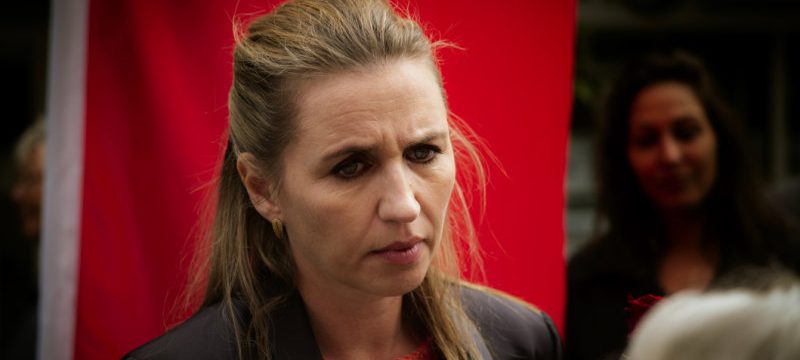Copenhagen: Denmark is set to become the third Nordic country in a year to form a leftist government after voters rebelled against austerity measures and dealt a blow to right-wing nationalists at elections on Wednesday.
The Social Democrats got about 25.9 per cent of the votes. Its leader, Mette Frederiksen, said the party would try to govern as a minority rather than form a governing coalition with others.
"You have chosen that Denmark should have a new majority, that Denmark should take a new direction," Frederiksen said told a jubilant crowd at Parliament. "And you have chosen that Denmark should have a new government."
Mette Frederiksen, leader of The Social Democrat party, talks to a voter ahead of the poll.Credit:Bloomberg
Prime Minister Lars Loekke Rasmussen has conceded defeat and will resign on Thursday.
The result paves the way for Frederiksen, 41, to become the country's youngest-ever prime minister.
Following two decades of liberal economic reforms, the vote marked a comeback for the Social Democrats, the main architects of the country's cradle-to-grave welfare system. It was the traditional party of power throughout the 20th century.
The final vote count showed the leftist opposition bloc received 96 seats against 79 for the ruling Liberal Party and others on the right.
Defeated: Danish Prime Minister Lars Loekke Rasmussen from the Liberal Party.Credit:AP
The nationalist Danish People's Party, which has supported Rasmussen's minority government, appeared to have lost its edge with most mainstream parties backing a tougher stance on immigration. Support for the party plummeted to 8.7 per cent from 21.1 per cent in the 2015 election.
Rasmussen, who has been prime minister since 2015 and also served from 2009 to 2011, said late on Wednesday that he would announce his government's resignation to Queen Margrethe on Thursday.
Denmark’s Crown Princess Mary, from Australia, toasts French President Emmanuel Macron, centre, next to Queen Margrethe, right, at Christiansborg Palace for a State Banquet last year.Credit:AP
Frederiksen's promise to increase welfare spending after years of austerity along with her tougher stance on immigration went down well with voters in opinion polls ahead of the vote.
"Welfare election"
The Nordic model has been the gold standard for welfare for many left-leaning politicians globally, including US Democratic presidential candidate Bernie Sanders, who has pointed to Denmark as a model for his vision of an ideal American future.
But ageing populations have prompted Nordic governments to chip away at the cradle-to-grave welfare state.
"This has been a welfare election, and voters' verdict has been completely clear. From now on, we make welfare the top priority in Denmark," Frederiksen said in her speech.
Mette Frederiksen, centre, gives away roses to voters in the last minutes of her campaign in her hometown of Aalborg, along with its mayor, Thomas Kastrup-Larsen, right.Credit:AP
Many Danes, who like counterparts in other Nordic states pay some of the highest taxes in the world to underpin their welfare system, worry that further austerity will erode the universal healthcare, education and elderly services long seen as a given.
Denmark, which is home to companies like toymaker Lego and brewer Carlsberg , has seen economic growth above the European Union average in the past decade.
In Finland and Sweden, the Social Democratic parties also formed governments earlier this year.
In Denmark, the Social Democrats remained the biggest party, with support holding at 2015 levels, according to the vote count.
Frederiksen would attempt to form a minority one-party government, she said, but may find it difficult to combine her own party's tougher immigration policies with the softer stance of most parties on the left.
The Social Democrats have backed tougher legislation, including a ban on wearing the body-covering Islamic burqa and niqab face veil in public, as well as a "jewellery bill" that allows police to seize refugees' valuables to help pay their costs.
The parties Frederiksen will rely on include the Socialist People's and the Social-Liberal parties, the latter which used to be headed by European Competition Commissioner Margrethe Vestager.
Both have campaigned for a more gentle immigration policy and greater efforts to combat climate change, echoing a surge in support for Europe's Greens at EU elections last month, surfing a global wave of climate activism.
A new Danish far-right party, Stram Kurs, which means hard line and that wants Islam banned and hundreds of thousands of Muslims deported, did not gain any seats in Parliament.
Greenland and the Faroe Islands, which are part of the Kingdom of Denmark with wide autonomy, each have two of Parliament's 179 seats.
Reuters, AP
Source: Read Full Article




